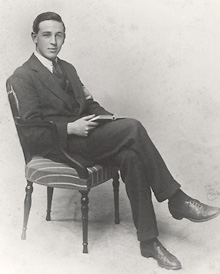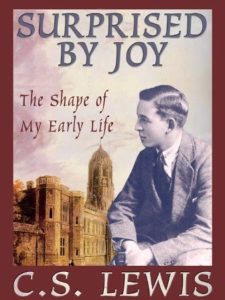The fool says in his heart, “There is no god.” Psalm 53:1
 For many years, C. S. Lewis was a fool. He later acknowledged the truth of that statement. As a young man who had seen his mother die of cancer despite his prayers, who had witnessed the horrors of the Great War, and who had been trained in severe logic by an atheist, he declared to himself that there was no god. As he put it in his autobiography Surprised by Joy,
For many years, C. S. Lewis was a fool. He later acknowledged the truth of that statement. As a young man who had seen his mother die of cancer despite his prayers, who had witnessed the horrors of the Great War, and who had been trained in severe logic by an atheist, he declared to himself that there was no god. As he put it in his autobiography Surprised by Joy,
I was at this time living, like so many Atheists or Antitheists, in a whirl of contradictions. I maintained that God did not exist. I was also very angry with God for not existing. I was equally angry with Him for creating a world.
There are many people who have that same attitude today. They rail against the god they say doesn’t exist. They, despite the logical incongruity of it, demand “justice.” Yet what is justice to an atheist? Why is demanding it incongruous? Lewis again, this time from Mere Christianity:
[When I was an atheist] my argument against God was that the universe seemed so cruel and unjust. But how had I got this idea of just and unjust?
A man does not call a line crooked unless he has some idea of a straight line. What was I comparing this universe with when I called it unjust? If the whole show was bad and senseless from A to Z, so to speak, why did I, who was supposed to be part of the show, find myself in such violent reaction against it?
Unlike many atheists, Lewis took his logic to its ultimate destination; he eventually saw the illogic of it:
Thus in the very act of trying to prove that God did not exist—in other words, that the whole of reality was senseless—I found I was forced to assume that one part of reality—namely my idea of justice—was full of sense.
His conclusion?
Consequently atheism turns out to be too simple. If the whole universe has no meaning, we should never have found out that it has no meaning [emphasis mine].
 Then, as Lewis continued to ponder the possible meaning of the universe and, as an academic, delved into his large stack of “books to be read”—something all avid readers will understand—he kept coming across sensible authors who, irritatingly, always turned out to be Christians. They came across as so sensible that he had to rethink everything.
Then, as Lewis continued to ponder the possible meaning of the universe and, as an academic, delved into his large stack of “books to be read”—something all avid readers will understand—he kept coming across sensible authors who, irritatingly, always turned out to be Christians. They came across as so sensible that he had to rethink everything.
As he explained in the autobiography,
A young man who wishes to remain a sound Atheist cannot be too careful of his reading. There are traps everywhere—“Bibles laid open, millions of surprises” as Herbert says, “fine nets and stratagems.” God is, if I may say it, very unscrupulous.
This “unscrupulous” God is our salvation. I thank Him daily for being so “very unscrupulous.”
That which is known about God is evident within them; for God made it evident to them. For since the creation of the world His invisible attributes, His eternal power and divine nature, have been clearly seen, being understood through what has been made, so that they are without excuse. Romans 1:19-20
